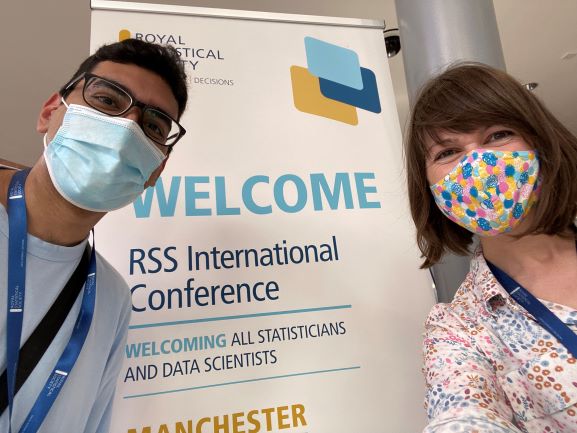Statistics
Women in Statistics
November 25, 2021 by Ally McAlpine No Comments | Category Farming and rural, Working in statistics
RESAS statisticians recently attended the Royal Statistical Society Annual Conference in Manchester. This month’s blog is written by Christina Coakley, Senior Assistant Statistician. Chrissy is now leading the analytical work to replace the June Agricultural Census. She also led the RESAS delegation at the RSS Conference. Here, she talks about her highlights from the conference including learning about women in statistics.
RESAS at the Royal Statistical Society
This was a great opportunity for us to present and discuss the technical approaches to the Scottish Crop Map. Daoud Sharif, our intern who coded the machine learning algorithm, and myself are pictured above. This event gave us a chance to showcase our work in person for the first time since it was published. We received good feedback from the audience on the quality assurance process which the team are now following up.
In another session we learned about Reproducible Analytical Pipelines (RAP). This talk is now starting to have an impact on the preparation for the work we are doing to transform Agricultural Statistics. RAP is a methodology developed from a technique used in software engineering. It streamlines processes and reduces human error by utilising coding best practise and open source software.
Also, RAPs are widely promoted to analysts by the Government Statistical Service. For instance, they are already being used within NHS Scotland. By using this approach, it will make it easier to understand how estimates are created from our survey data. And, it puts open-source at the heart of our work.
Recently, I integrated some of these methods in the development of the Scottish Crop Map. My challenge is to lead the application of the same approaches in the June Agricultural Census. I am excited to be taking this learning into the more traditional agricultural statistics.
Women in Statistics
The conference had a large breadth of topics. It was wonderful to see there were three sessions dedicated to women in statistics. One session included women who entered into statistics soon after Florence Nightingale. Another session was on how women are breaking barriers in statistics and data science today.
The standout talk for me was from Dr Sophie Carr. Sophie is the founder and director offering specialist statistical consultancy. She presented an inspiring presentation about how she set up a company and created an environment which balanced her work and home life, whilst also creating an inclusive environment within her company. You can read more about her talk and others on the RSS website.
It is reassuring to see the improvements in the gender balance of statisticians over the years. Although there are still important steps we need to take to create equality within the statistical field. This was highlighted in one of the sessions. It focussed on how we could help to improve under representation of minorities and women in statistics via editing Wikipedia. The aim is to make these important figures, irrespective of race or gender, seen and acknowledged.
Get Involved
Would you like to nominate someone to be included on Wikipedia? If so, you can find out more here, and make your nomination by visiting the link here.
Finally, I look forward to seeing how the field of statistics continues this inclusive journey. Because, statistics will be enhanced by diverse and brilliant statisticians.
Tags: agriculture, analytical pipelines, diversity, inclusion


Leave a comment
You must be logged in to post a comment.